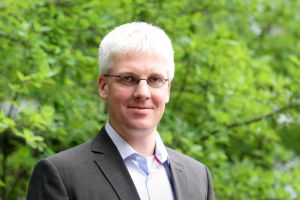This year’s Alfried Krupp Prize for Young University Teachers goes to Professor Christian Koos of KIT. The board of trustees of the Alfried Krupp von Bohlen und Halbach Foundation unanimously decided in favor of the 34-year-old engineer, who teaches and conducts research into photonic communication technology. Koos won over 65 other young scientists proposed for the prize. The prize is endowed with an amount of 1 million euros.
At the Institute of Photonics and Quantum Electronics (IPQ) and at the Institute of Microstructure Technology (IMT) of KIT, Koos studies nanophotonic components, by means of which communication processes can be accelerated and their energy efficiency enhanced. Using these components, high-performance optical circuits can be integrated on microchips for the transmission and reception of data rates in the order of several terabits per second, corresponding to about one billion telephone conversations. Instead of expensive and rare compound semiconductors, silicon is used for chip manufacture. This element already is an established starting material for electronic and electromechanical microsystems. Its resources on Earth are nearly unlimited.
Work of Christian Koos focuses on hybrid integration methods to combine silicon waveguides with organic materials. Optical properties of these materials can be adjusted specifically via the molecular structure. Hence, a large variety of components can be implemented on a single chip. As the waveguides used are extremely small – up to 1000 times thinner than a human hair – it is possible to accommodate a very high number of components in smallest space.
Research conducted by Christian Koos contributes decisively to reducing the energy consumption of the internet. Today’s information and communication technology already has a share of more than 10% in total electricity consumption in Germany, and data traffic is growing continuously.
About Christian Koos:
Koos studied electrical engineering and information technology at the former Universität Karlsruhe (TH), one of the predecessor institutions of KIT, and was conferred his doctorate at the Institute of Photonics and Quantum Electronics. Then, he moved to Carl Zeiss AG and headed the technology radars Nanotechnology and Metrology within the Corporate Research and Technology Department. In March 2010, he accepted the professorship for photonic communication technology at KIT. Koos made more than 100 frequently cited publications in international journals and proceedings and about the same number of expert presentations. He applied for more than 15 patents. In June 2011, he was granted an ERC starting grant in the amount of EUR 1.5 million by the European Union.
About the Alfried Krupp Prize for Young University Teachers:
Since 1986, the Alfried Krupp Prize for Young Scientists holding a first professorship at a German university has been granted annually by the non-profit Alfried Krupp von Bohlen und Halbach Foundation. It is one of the prizes in the highest amounts for young scientists. The prize money of 1 million euros is intended to enable researchers to improve their working environment within a period of five years irrespective of public funding and to advance their research and teaching work.
Being “The University in the Helmholtz Association”, KIT creates and imparts knowledge for the society and the environment. It is the objective to make significant contributions to the global challenges in the fields of energy, mobility, and information. For this, about 10,000 employees cooperate in a broad range of disciplines in natural sciences, engineering sciences, economics, and the humanities and social sciences. KIT prepares its 22,800 students for responsible tasks in society, industry, and science by offering research-based study programs. Innovation efforts at KIT build a bridge between important scientific findings and their application for the benefit of society, economic prosperity, and the preservation of our natural basis of life. KIT is one of the German universities of excellence.

